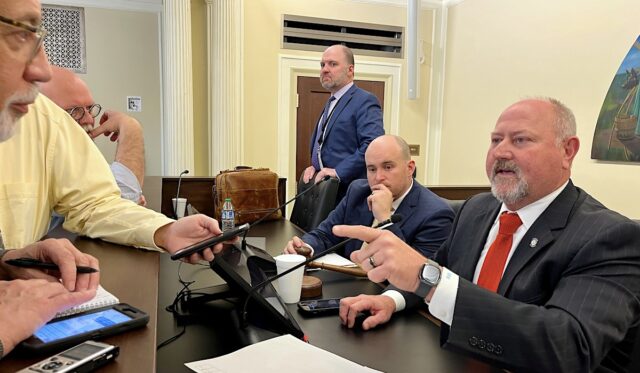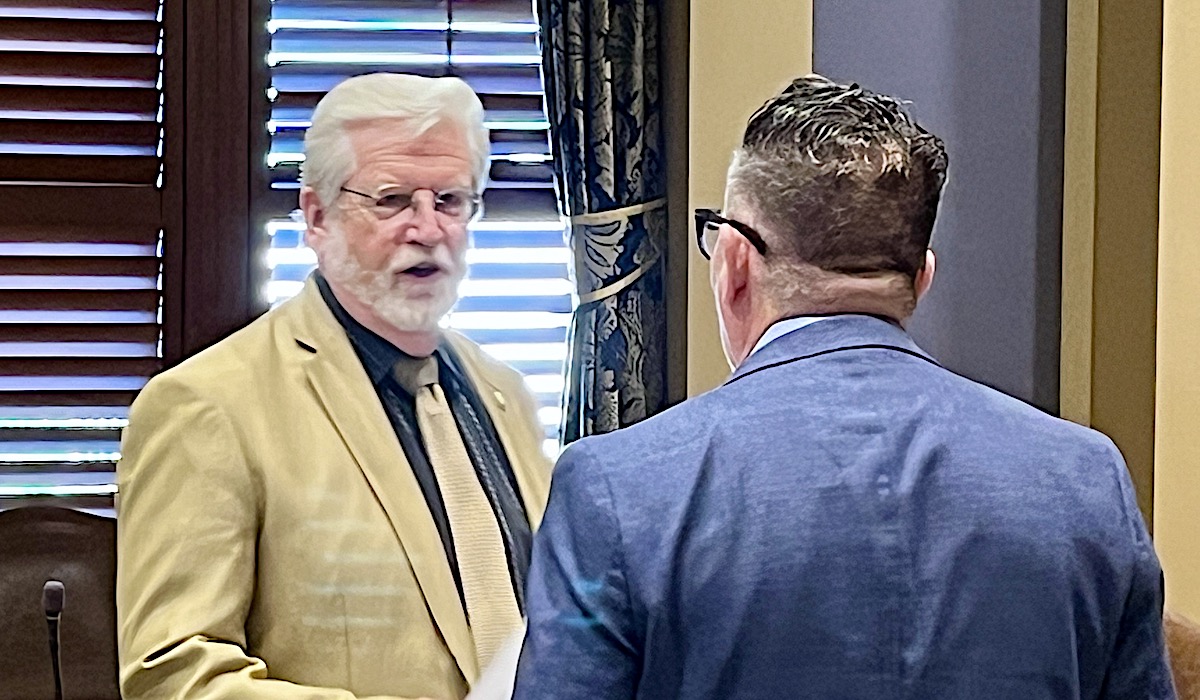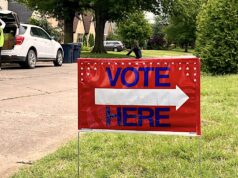

Shortly after 10 a.m. today, Senate Appropriations and Budget Committee Chairman Roger Thompson headed for a conversation with the Senate’s president pro tempore instead of gaveling into the committee meeting that had been scheduled to consider House budget-related bills.
“We ended up with a little bit of free time,” Thompson said jovially, a tonal departure from last Wednesday’s meeting monologue that inflamed the year’s first definite dispute between the chambers. “We still don’t have the public numbers from the House.”
Last week, Thompson and Senate President Pro Tempore Greg Treat (R-OKC) said they would not hear House bills with fiscal impacts in the Senate Appropriations and Budget Committee without the House first providing its starting numbers for negotiation in the form of spreadsheets that could be displayed publicly during Senate committee meetings.
House Appropriations and Budget Committee Chairman Kevin Wallace (R-Wellston) responded by criticizing the Senate for not agreeing to call Joint Committee Appropriations and Budget — or JCAB — meetings to address a $16 million issue in the current year’s State Department of Education budget for teacher raises passed last year.
On Monday, Wallace presented his fellow House Republican Caucus members with a variety of budget numbers and said the conversations would continue with his caucus throughout the week. He told NonDoc the Senate would receive the spreadsheets requested of the House “whenever we complete the House process.”
“I started today presenting numbers to the caucus,” Wallace said Monday. “Typically, we exchange spreadsheets that [contain] embargoed information, and we negotiate back and forth. That’s not the way the Senate wants to do it, so before I give them the House numbers — which is a working document right now — I need to make sure I get the caucus filled in and the buy-in and make any changes that the caucus wants between now and then. I hope to have it done by the end of the week. No guarantees.”
On Tuesday, Wallace, Thompson and their respective committee vice chairmen met over lunch and reviewed some numbers without the House’s spreadsheets changing hands.
“We had a good lunch meeting,” Thompson (R-Okemah) said Wednesday morning. “They’re meeting with their caucus. We did not receive any copies from them yesterday. We discussed some areas yesterday that they have high priorities on.
“I definitely respect their process. However, our process is that we want to make sure we have the spreadsheets that we can go up with (on the monitor) as we work on the budget. When we get their public numbers, we will continue the conversation.”
Wednesday afternoon, as members left the House floor and prepared for a 4 p.m. Appropriations and Budget Committee meeting, Vice Chairman Trey Caldwell (R-Lawton) said the House “will continue to see what they do” in the Senate.
“The Oklahoma House of Representatives is going to continue to do the one thing we are constitutionally obligated to do, which is to work toward and pass a balanced budget for the state of Oklahoma,” Caldwell said.
Caldwell echoed Wallace’s consistent talking point this year: that the House system “has always been one of the most open and transparent processes.”
“We want to operate in good faith and get this process done. I think at this point if everyone poking and going eye-for-an-eye, we will all be blind,” Caldwell said. “Once we have buy-in from all of our members, then we will put something on the board.”
A possible prescription is more cowbell JCAB?

Late Wednesday, the House Appropriations and Budget Committee did what its counterparts across the rotunda did not: conduct a meeting to hear bills.
Unlike last week, Wallace abstained from referencing the Senate’s meeting cancelation. He did, however, refer to his committee’s gathering as, “Civics and Government 101”
House members set their own deadline for Senate appropriations bills to advance from the House committee by April 19, but the Senate’s deadline for House bills has been Friday, April 12.
With the Senate committee canceled Wednesday and the House’s spreadsheets still squarely in their possession, it remains unclear whether Treat and his caucus will extend their deadline a week to match the House’s. If the Senate does not, dozens of House vehicles would suddenly stall on the side of Legislature Lane.
On Wednesday afternoon, Treat said Senate leaders are “exploring options.”
“Right now, the deadline is this week to get it done. We’re exploring opportunities,” Treat said. “We want to make sure first and foremost that we follow through all the way to the end being committed to this new budget process and transparency, and whatever helps us achieve those goals is what will follow.”
Treat said he has “over-communicated” for months that the Senate’s new budget process would have “implications” on the House because their numbers would be “immediately public” when given to the Senate.
“The speaker, this week when I met with him, acknowledged that they’re just not ready to share their numbers publicly,” Treat said. “So hopefully they can get their caucus where they are more up to speed on the position of the House on the budget and that will lead to a more productive negotiation between the House and the Senate.”
Earlier in the day, Thompson also reiterated that “this is deadline week.”
“I anticipate that we are going to do more by JCAB in putting the budget together,” Thompson said. “We’re going to talk more in caucus [about] what that process looks like. We want to make that as open as possible.”
But Treat has previously noted the “opaque” nature of JCAB, which has specific rules under which bills are quickly revealed and voted on without the ability for amendments. As a result, senators have said their new budget negotiation format would provide more transparency than the JCAB-heavy process used in recent years — if the House will play ball.
In Wednesday’s caucus meeting, senators at least briefly discussed the idea that they could extend their deadline for House budget-related bills by one week in the hope House spreadsheets would be delivered Monday or Tuesday.
“That’s a possibility. That’s going to be up to the pro tem,” Thompson said. “I don’t know what the end process is going to be, but my recommendation is that we will have the JCAB bills, call the appropriation and JCAB committee together — same people — throw everything up on the board (but take) no votes. Let’s just talk about them all the way through. Make sure people answer all the questions. The public will know. And then we’ll come back probably within two days of that time — maybe three days — and we’ll have votes on it. All public.”
Thompson appeared to take a less critical approach to the House’s budget discussions than he did last week.
“We’re not in a good spot as far as timeline, however, I think the process is worth taking the time to do it,” Thompson said. “We started out wanting to be open and transparent. We want to continue that through this process. I think that’s driving the conversation on the House side. They need to get their caucus on board before they go public. It’s driving more conversations with our members moving forward, and so we still have to land the plane. There is a lot of work to get done between now and sine die.”
Speaking Monday, Wallace said he believes the chambers are not terribly far apart.
“On the majority (of questions), there is alignment between the chambers and the subcommittee chairs, House and Senate. There are a few areas where we’ve got some work to do,” Wallace said. “Once I hand [the Senate] the numbers, they said that they want to put them up and basically give them a consent (vote) up or down on every one of our numbers. That’s a new process. They can adopt a process, they just can’t make us implement it. Just like if we adopt a new process, I don’t think we can make the Senate adhere to a House process.”
What the House and Senate could do — Wallace hopes — is call a JCAB meeting to send $16.1 million to the State Department of Education and resolve the issue related to how certain smaller school districts can cover teacher pay raises passed last year. That meeting would simply address funding to address an issue in Fiscal Year 2024, not the FY 2025 budget being negotiated this session.
“There is discussion about the $16.1 million supplemental for SDE,” Thompson said. “I have not seen any definitive language.”
Wallace said Treat and House Speaker Charles McCall (R-Atoka) are negotiating the decision on when to schedule a JCAB for the lingering FY 2024 issue.
Regarding the teacher raises passed last year, Treat said the Senate wants to pursue permanent funding for “off-formula” rural school districts that receive such significant property tax revenue — often owing to wind farms or petroleum pipelines — that their per-pupil expenditures are already above the state average.
As a result, those districts do not receive state aid unless lawmakers specifically appropriate it, which both chambers say they intended to do last year. Treat said disagreement exists over whether that money should be provided for subsequent years.
“They sent late yesterday afternoon a few drafts of their proposed language on it,” Treat said. “They’ve made it clear in communication with me that they have no interest in paying the off-the-formula teachers past the current budget year.”
In the meantime, as he continues to examine the Senate’s FY 2025 proposals, Wallace said he wants to adjust how the Legislature presents so-called “one-time” appropriations to agencies, such as a $160 million allocation last year to the State Department of Education specified for three-year pilot programs on school safety and elementary student literacy.
As a result, it may appear as though the state common education budget for FY 2025 will decrease by $160 million, even though the agency’s appropriation will be functionally the same as last year.
“Instead of having it see-saw and spike up and down, get it off of an agency’s sheet and put them in supplemental or the miscellaneous file,” Wallace said.
Wallace used the Drought Commission as an example.
“Last year, we had a significant investment. Instead of running that through [the Department of Agriculture, Food and Forestry] budget so it looks like they have a huge spike, I am proposing creating separate revolving funds that will be as a miscellaneous items versus an agency appropriation that would see-saw — spike and drop — an agency’s baseline,” Wallace said. “So there’s some of that stuff that I’m carrying on a miscellaneous sheet in the back that, once we get a chance to visit and negotiate a little bit and explain what I think we should do or the House’s position, hopefully they’ll agree. If not, they’ll come back with (an alternative).”




















